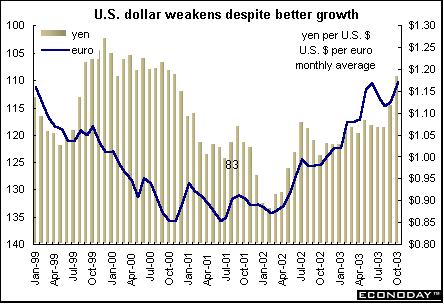U.S. dollar ($)
The dollar has stabilized somewhat over recent weeks as U.S. growth prospects have improved and overseas investors have become less dollar negative. But the dollar has lost value against all the major currencies including the euro, yen, Swiss franc, and British pound sterling. The erosion of the U.S. dollar's value is an example of a trend that has characterized currency markets recently - the investors' search for yield. Now that equity prices have turned around globally after three years of declines and fears that U.S. interest rates could sink even further have receded, investors are shifting their focus back to growth and future returns despite qualms about the burgeoning twin deficits.
The allure of U.S. assets, particularly at the end of the 1990s, bid the dollar up in value as investors competed for positions in the equities market and purchased companies for a place in the U.S. market. Currency market players continue to pounce on anything negative United States despite the on-going problems in Europe and Japan. The dollar's decline has been attributed to several factors other than the search for yield including the large current account deficit, which requires large inflows of foreign investment, U.S. growth worries and the overhang of geopolitical problems. The plus side of a weaker dollar is that it makes U.S. exports more competitive abroad. It also raises the value of repatriated profits to the United States.

|



